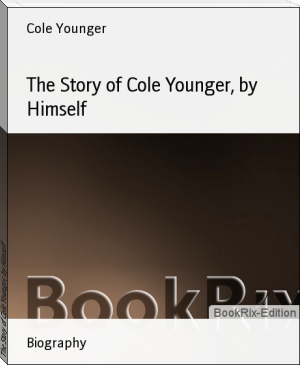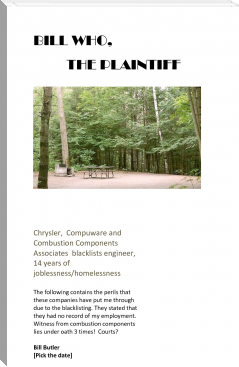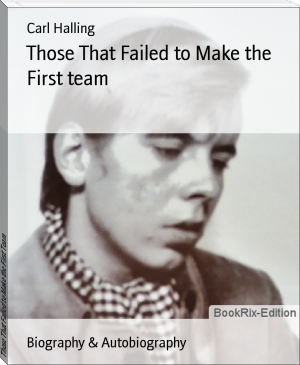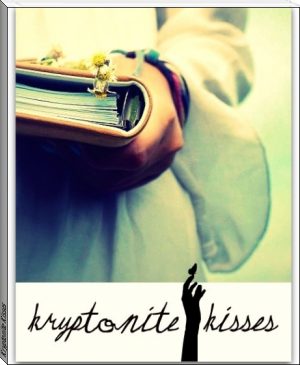The Story of Cole Younger, by Himself - Cole Younger (good novels to read in english .TXT) 📗

- Author: Cole Younger
Book online «The Story of Cole Younger, by Himself - Cole Younger (good novels to read in english .TXT) 📗». Author Cole Younger
in the union depot at St. Louis, was among our visitors at Faribault.
Another was Detective Bligh, of Louisville, who believed then, and probably did ever afterward, that I had been in the Huntington, West Virginia, robbery, and tried to pump me about it.
Four indictments were found against us. One charged us with being accessory to the murder of Cashier Heywood, another with assaulting Bunker with intent to do great bodily harm, and the third with robbing the First National bank of Northfield. The fourth charged me as principal and my brothers as accessories with the murder of Gustavson. Two witnesses had testified before the grand jury identifying me as the man who fired the shot that hit him, although I know I did not, because I fired no shot in that part of town.
Although not one of us had fired the shot that killed either Heywood or Gustavson, our attorneys, Thomas Rutledge of Madelia and Bachelder and Buckham of Faribault, asked, when we were arraigned, Nov. 9, that we be given two days in which to plead.
They advised us that as accessories were equally guilty with the principals, under the law, and as by pleading guilty we could escape capital punishment, we should plead guilty. There was little doubt, under the circumstances, of our conviction, and under the law as it stood then, an accused murderer who pleaded guilty was not subject to the death penalty. The state was new, and the law had been made to offer an inducement to murderers not to put the county to the expense of a trial.
The excitement that followed our sentence to state prison, which was popularly called “cheating the gallows,” resulted in the change of the law in that respect.
The following Saturday we pleaded guilty, and Judge Lord sentenced us to imprisonment for the remainder of our lives in the state prison at Stillwater, and a few days later we were taken there by Sheriff Barton.
With Bob it was a life sentence, for he died there of consumption Sept. 16, 1889. He was never strong physically after the shot pierced his lung in the last fight near Madelia.
31. SOME PRIVATE HISTORY
Every blood-and-thunder history of the Younger brothers declares that Frank and Jesse James were the two members of the band that entered Northfield who escaped arrest or death.
They were not, however. One of those two men was killed afterward in Arizona and the other died from fever some years afterward.
There were reasons why the James and the Younger brothers could not take part in any such project as that at Northfield.
Frank James and I came together as soldiers some little time before the Lawrence raid. He was a good soldier, and while he never was higher than a private the distinctions between the officers and the men were not as finely drawn in Quantrell’s command as they are nowadays in military life. As far back as 1862, Frank James and I formed a friendship, which has existed to this day.
Jesse James I never met, as I have already related, until the early summer of 1866. The fact that all of us were liable to the visits of posses when least expected gave us one interest in common, the only one we ever did have, although we were thrown together more or less through my friendship with Frank James.
The beginning of my trouble with Jesse came in 1872, when George W. Shepherd returned to Lee’s Summit after serving a term in prison in Kentucky for the bank robbery at Russellville in 1868.
Jesse had told me that Shepherd was gunning for me, and accordingly one night, when Shepherd came late to the home of Silas Hudspeth, where I was, I was prepared for trouble, as in fact, I always was anyway.
When Shepherd called, Hudspeth shut the door again, and told me who was outside. I said “let him in,” and stepping to the door with my pistol in my hand, I said:
“Shepherd, I am in here; you’re not afraid, are you?”
“That’s all right,” he answered. “Of course I’m not afraid.” The three of us talked till bedtime, when Hudspeth told us to occupy the same bed. I climbed in behind, and as was my custom, took my pistol to bed with me. Shepherd says he did not sleep a wink that night, but I did. At breakfast next morning, I said:
“I heard yesterday that you intended to kill me on sight; have you lost your nerve?”
“Who told you that, Cole?” he answered.
“I met Jess yesterday and he told me that you sent that message to me by him.”
Soon after I met Jesse James, and but for the interference of friends we would have shot it out then and there.
My feeling toward Jesse became more bitter in the latter part of that year, when after the gate robbery at the Kansas City fair, he wrote a letter to the Times of that city declaring that he and I had been accused of the robbery, but that he could prove an alibi. So far as I know that is the first time my name was ever mentioned in connection with the Kansas City robbery.
In 1874, when Detective Whicher was killed on a trip to arrest Frank and Jesse James, I was angered to think that Jesse and his friends had brought Whicher from Kearney to the south side of the river, which I then believed was done to throw suspicion on the boys in Jackson county, of whom, perhaps, I would be most likely to get the credit. I have since learned, however, from the men who did kill Whicher, that Jesse did not kill him, but had believed his story and had been inclined to welcome him as a fellow wanderer. Whicher declared that he had murdered his wife and children in the East and he was seeking a refuge from the officers of the law. But Jesse’s comrades were skeptical, and when they found on Whicher a pistol bearing Pinkerton’s mark, they started with him for Kansas City intending to leave him dead in the street there. Shortly after they crossed to the Independence side of the river, the sound of a wagon on the frozen ground impelled them to finish the job where they were, as it was almost daybreak and they did not want to be seen with their captive.
But Jesse and I were not on friendly terms at any time after the Shepherd affair, and never were associated in any enterprises.
32. LOST—TWENTY-FIVE YEARS
When the iron doors shut behind us at the Stillwater prison I submitted to the prison discipline with the same unquestioning obedience that I had exacted during my military service, and Jim and Bob, I think, did the same.
For ten years and a half after our arrival, Warden Reed remained. The first three years there was a popular idea that such desperate men as the Youngers would not stay long behind prison walls, and that especial watchfulness must be exercised in our case. Accordingly the three of us were put at work making buckets and tubs, with Ben Cayou over us as a special guard, when in our dreams we had been traveling to South America on Ben Butler’s money.
Then we were put in the thresher factory. I made the sieves, while Jim sewed the belts, and Bob made the straw-carriers and elevators.
The latter part of the Reed regime I was in the storeroom.
Jan. 25, 1884, when we had been in the prison something over seven years, the main prison building was destroyed by fire at night. George P. Dodd, who was then connected with the prison, while his wife was matron, and who still lives in Buffalo, Minn., said of our behavior that night:
“I was obliged to take the female convicts from their cells and place them in a small room that could not be locked. The Youngers were passing and Cole asked if they could be of any service. I said: ‘Yes, Cole. Will you three boys take care of Mrs. Dodd and the women?’ Cole answered: ‘Yes, we will, and if you ever had any confidence in us place it in us now.’ I told him I had the utmost confidence and I slipped a pistol to Cole as I had two. Jim, I think, had an ax handle and Bob a little pinch bar. The boys stood before the door of the little room for hours and even took the blankets they had brought with them from their cells and gave them to the women to try and keep them comfortable as it was very cold. When I could take charge of the women and the boys were relieved, Cole returned my revolver.”
Next morning Warden Reed was flooded with telegrams and newspaper sensations: “Keep close watch of the Youngers;” “Did the Youngers escape?” “Plot to free the Youngers,” and that sort of thing.
The warden came to his chief deputy, Abe Hall, and suggested that we be put in irons, not that he had any fear on our account, but for the effect on the public.
“I’ll not put irons on ’em,” replied Hall.
And that day Hall and Judge Butts took us in a sleigh down town to the county jail where we remained three or four weeks. That was the only time we were outside the prison enclosure from 1876 till 1901.
When H. G. Stordock became warden, I was made librarian, while Jim carried the mail and Bob was clerk to the steward where we remained during the administration of Wardens Randall and Garvin, except Bob, who wasted away from consumption and died in September, 1889.
When Warden Wolfer came to the prison, he put Jim in charge of the mail and the library, and I was set at work in the laundry temporarily while the new hospital building was being made ready. I was then made head nurse in the hospital, and remained there until the day we were paroled, Warden Reeve, who was there for two years under the administration of Gov. Lind, leaving us there.
Every one of these wardens was our friend, and the deputy wardens, too. Abe Hall, Will Reed, A. D. Westby, Sam A. Langum, T. W. Alexander, and Jack Glennon were all partisans of ours. If any reader misses one name from this list of deputy wardens, there is nothing I have to say for or against him.
Dr. Pratt, who was prison physician when we went to Stillwater, Dr. T. C. Clark, who was his assistant, and Dr. B. J. Merrill, who has been prison physician since, have been staunch partisans of the Younger boys in the efforts of our friends to secure our pardon. And the young doctors with whom I was thrown in close contact during their service as assistant prison physicians, Drs. Sidney Boleyn, Gustavus A. Newman, Dan Beebe, A. E. Hedbeck, Morrill Withrow, and Jenner Chance, have been most earnest in their championship of our cause.
The stewards, too, Benner, and during the Reeve regime, Smithton, which whom as head nurse I was thrown in direct contact, never had any difficulty with me, although Benner with a twinkle in his eye, would say to me:
“Cole, I believe you come and get peaches for your patients up there long after they are dead.”
The invalids in that hospital always
Another was Detective Bligh, of Louisville, who believed then, and probably did ever afterward, that I had been in the Huntington, West Virginia, robbery, and tried to pump me about it.
Four indictments were found against us. One charged us with being accessory to the murder of Cashier Heywood, another with assaulting Bunker with intent to do great bodily harm, and the third with robbing the First National bank of Northfield. The fourth charged me as principal and my brothers as accessories with the murder of Gustavson. Two witnesses had testified before the grand jury identifying me as the man who fired the shot that hit him, although I know I did not, because I fired no shot in that part of town.
Although not one of us had fired the shot that killed either Heywood or Gustavson, our attorneys, Thomas Rutledge of Madelia and Bachelder and Buckham of Faribault, asked, when we were arraigned, Nov. 9, that we be given two days in which to plead.
They advised us that as accessories were equally guilty with the principals, under the law, and as by pleading guilty we could escape capital punishment, we should plead guilty. There was little doubt, under the circumstances, of our conviction, and under the law as it stood then, an accused murderer who pleaded guilty was not subject to the death penalty. The state was new, and the law had been made to offer an inducement to murderers not to put the county to the expense of a trial.
The excitement that followed our sentence to state prison, which was popularly called “cheating the gallows,” resulted in the change of the law in that respect.
The following Saturday we pleaded guilty, and Judge Lord sentenced us to imprisonment for the remainder of our lives in the state prison at Stillwater, and a few days later we were taken there by Sheriff Barton.
With Bob it was a life sentence, for he died there of consumption Sept. 16, 1889. He was never strong physically after the shot pierced his lung in the last fight near Madelia.
31. SOME PRIVATE HISTORY
Every blood-and-thunder history of the Younger brothers declares that Frank and Jesse James were the two members of the band that entered Northfield who escaped arrest or death.
They were not, however. One of those two men was killed afterward in Arizona and the other died from fever some years afterward.
There were reasons why the James and the Younger brothers could not take part in any such project as that at Northfield.
Frank James and I came together as soldiers some little time before the Lawrence raid. He was a good soldier, and while he never was higher than a private the distinctions between the officers and the men were not as finely drawn in Quantrell’s command as they are nowadays in military life. As far back as 1862, Frank James and I formed a friendship, which has existed to this day.
Jesse James I never met, as I have already related, until the early summer of 1866. The fact that all of us were liable to the visits of posses when least expected gave us one interest in common, the only one we ever did have, although we were thrown together more or less through my friendship with Frank James.
The beginning of my trouble with Jesse came in 1872, when George W. Shepherd returned to Lee’s Summit after serving a term in prison in Kentucky for the bank robbery at Russellville in 1868.
Jesse had told me that Shepherd was gunning for me, and accordingly one night, when Shepherd came late to the home of Silas Hudspeth, where I was, I was prepared for trouble, as in fact, I always was anyway.
When Shepherd called, Hudspeth shut the door again, and told me who was outside. I said “let him in,” and stepping to the door with my pistol in my hand, I said:
“Shepherd, I am in here; you’re not afraid, are you?”
“That’s all right,” he answered. “Of course I’m not afraid.” The three of us talked till bedtime, when Hudspeth told us to occupy the same bed. I climbed in behind, and as was my custom, took my pistol to bed with me. Shepherd says he did not sleep a wink that night, but I did. At breakfast next morning, I said:
“I heard yesterday that you intended to kill me on sight; have you lost your nerve?”
“Who told you that, Cole?” he answered.
“I met Jess yesterday and he told me that you sent that message to me by him.”
Soon after I met Jesse James, and but for the interference of friends we would have shot it out then and there.
My feeling toward Jesse became more bitter in the latter part of that year, when after the gate robbery at the Kansas City fair, he wrote a letter to the Times of that city declaring that he and I had been accused of the robbery, but that he could prove an alibi. So far as I know that is the first time my name was ever mentioned in connection with the Kansas City robbery.
In 1874, when Detective Whicher was killed on a trip to arrest Frank and Jesse James, I was angered to think that Jesse and his friends had brought Whicher from Kearney to the south side of the river, which I then believed was done to throw suspicion on the boys in Jackson county, of whom, perhaps, I would be most likely to get the credit. I have since learned, however, from the men who did kill Whicher, that Jesse did not kill him, but had believed his story and had been inclined to welcome him as a fellow wanderer. Whicher declared that he had murdered his wife and children in the East and he was seeking a refuge from the officers of the law. But Jesse’s comrades were skeptical, and when they found on Whicher a pistol bearing Pinkerton’s mark, they started with him for Kansas City intending to leave him dead in the street there. Shortly after they crossed to the Independence side of the river, the sound of a wagon on the frozen ground impelled them to finish the job where they were, as it was almost daybreak and they did not want to be seen with their captive.
But Jesse and I were not on friendly terms at any time after the Shepherd affair, and never were associated in any enterprises.
32. LOST—TWENTY-FIVE YEARS
When the iron doors shut behind us at the Stillwater prison I submitted to the prison discipline with the same unquestioning obedience that I had exacted during my military service, and Jim and Bob, I think, did the same.
For ten years and a half after our arrival, Warden Reed remained. The first three years there was a popular idea that such desperate men as the Youngers would not stay long behind prison walls, and that especial watchfulness must be exercised in our case. Accordingly the three of us were put at work making buckets and tubs, with Ben Cayou over us as a special guard, when in our dreams we had been traveling to South America on Ben Butler’s money.
Then we were put in the thresher factory. I made the sieves, while Jim sewed the belts, and Bob made the straw-carriers and elevators.
The latter part of the Reed regime I was in the storeroom.
Jan. 25, 1884, when we had been in the prison something over seven years, the main prison building was destroyed by fire at night. George P. Dodd, who was then connected with the prison, while his wife was matron, and who still lives in Buffalo, Minn., said of our behavior that night:
“I was obliged to take the female convicts from their cells and place them in a small room that could not be locked. The Youngers were passing and Cole asked if they could be of any service. I said: ‘Yes, Cole. Will you three boys take care of Mrs. Dodd and the women?’ Cole answered: ‘Yes, we will, and if you ever had any confidence in us place it in us now.’ I told him I had the utmost confidence and I slipped a pistol to Cole as I had two. Jim, I think, had an ax handle and Bob a little pinch bar. The boys stood before the door of the little room for hours and even took the blankets they had brought with them from their cells and gave them to the women to try and keep them comfortable as it was very cold. When I could take charge of the women and the boys were relieved, Cole returned my revolver.”
Next morning Warden Reed was flooded with telegrams and newspaper sensations: “Keep close watch of the Youngers;” “Did the Youngers escape?” “Plot to free the Youngers,” and that sort of thing.
The warden came to his chief deputy, Abe Hall, and suggested that we be put in irons, not that he had any fear on our account, but for the effect on the public.
“I’ll not put irons on ’em,” replied Hall.
And that day Hall and Judge Butts took us in a sleigh down town to the county jail where we remained three or four weeks. That was the only time we were outside the prison enclosure from 1876 till 1901.
When H. G. Stordock became warden, I was made librarian, while Jim carried the mail and Bob was clerk to the steward where we remained during the administration of Wardens Randall and Garvin, except Bob, who wasted away from consumption and died in September, 1889.
When Warden Wolfer came to the prison, he put Jim in charge of the mail and the library, and I was set at work in the laundry temporarily while the new hospital building was being made ready. I was then made head nurse in the hospital, and remained there until the day we were paroled, Warden Reeve, who was there for two years under the administration of Gov. Lind, leaving us there.
Every one of these wardens was our friend, and the deputy wardens, too. Abe Hall, Will Reed, A. D. Westby, Sam A. Langum, T. W. Alexander, and Jack Glennon were all partisans of ours. If any reader misses one name from this list of deputy wardens, there is nothing I have to say for or against him.
Dr. Pratt, who was prison physician when we went to Stillwater, Dr. T. C. Clark, who was his assistant, and Dr. B. J. Merrill, who has been prison physician since, have been staunch partisans of the Younger boys in the efforts of our friends to secure our pardon. And the young doctors with whom I was thrown in close contact during their service as assistant prison physicians, Drs. Sidney Boleyn, Gustavus A. Newman, Dan Beebe, A. E. Hedbeck, Morrill Withrow, and Jenner Chance, have been most earnest in their championship of our cause.
The stewards, too, Benner, and during the Reeve regime, Smithton, which whom as head nurse I was thrown in direct contact, never had any difficulty with me, although Benner with a twinkle in his eye, would say to me:
“Cole, I believe you come and get peaches for your patients up there long after they are dead.”
The invalids in that hospital always
Free e-book «The Story of Cole Younger, by Himself - Cole Younger (good novels to read in english .TXT) 📗» - read online now
Similar e-books:





Comments (0)